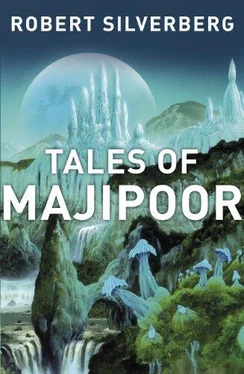Robert Silverberg - The Tomb of the Pontifex Dvorn
Здесь есть возможность читать онлайн «Robert Silverberg - The Tomb of the Pontifex Dvorn» весь текст электронной книги совершенно бесплатно (целиком полную версию без сокращений). В некоторых случаях можно слушать аудио, скачать через торрент в формате fb2 и присутствует краткое содержание. Год выпуска: 2013, ISBN: 2013, Издательство: Gollancz, Жанр: Фэнтези, на английском языке. Описание произведения, (предисловие) а так же отзывы посетителей доступны на портале библиотеки ЛибКат.
- Название:The Tomb of the Pontifex Dvorn
- Автор:
- Издательство:Gollancz
- Жанр:
- Год:2013
- ISBN:978-0-575-13006-7
- Рейтинг книги:4 / 5. Голосов: 1
-
Избранное:Добавить в избранное
- Отзывы:
-
Ваша оценка:
- 80
- 1
- 2
- 3
- 4
- 5
The Tomb of the Pontifex Dvorn: краткое содержание, описание и аннотация
Предлагаем к чтению аннотацию, описание, краткое содержание или предисловие (зависит от того, что написал сам автор книги «The Tomb of the Pontifex Dvorn»). Если вы не нашли необходимую информацию о книге — напишите в комментариях, мы постараемся отыскать её.
The Tomb of the Pontifex Dvorn — читать онлайн бесплатно полную книгу (весь текст) целиком
Ниже представлен текст книги, разбитый по страницам. Система сохранения места последней прочитанной страницы, позволяет с удобством читать онлайн бесплатно книгу «The Tomb of the Pontifex Dvorn», без необходимости каждый раз заново искать на чём Вы остановились. Поставьте закладку, и сможете в любой момент перейти на страницу, на которой закончили чтение.
Интервал:
Закладка:
As calmly as he could Simmilgord said, “You’re being absurd, Lutiel. Are you telling me that we do all our work purely for ourselves, that we’re like priests of some arcane cult who go through rites and rituals that have no relevance whatever to the real world and the lives of real people in it?”
Lutiel laughed harshly. “And you, Simmilgord? What are you telling me ? Not a shred of integrity in you, is that it? Ready to sell yourself to the first bidder who comes along?”
Simmilgord gasped. Perhaps, he thought, Lutiel was some sort of monk at heart, too pure for this world. But this was going too far.
“When did I ever say—”
“I saw the way you lit up when the Skandar told you you were just the man for the job of putting together the historical side of the new monument.”
“Of course I did. Why shouldn’t I? It’s a tremendous opportunity to put the story of Dvorn across to thousands, even millions of people. And you—when he told you essentially the same thing as he put you in charge of supervising the reconstruction of the murals, the creation of replica that look better than the originals—what did you feel?”
“What I felt was disgust,” Lutiel said. “Indignation. I kept my mouth shut, because I couldn’t bring myself to stand up to Hawid Zakayil to his face, any more than anyone else can. I told you I’m no publicist, Simmilgord, and certainly I’m not a showman either. Or some sort of theatrical impresario. What I am is a scientist. And so are you, whether you want to believe it or not. You’re an historian. History is a science, or should be, anyway. And scientists have no business getting involved in anything as sordid as this.”
Sordid?
Simmilgord’s head was beginning to ache. He wanted to slide away from this discussion somehow. He was ashamed to face Lutiel.
That stinging charge of hypocrisy—of whoring, even—hurt him deeply. Lutiel was his closest friend. For Lutiel to see him as a hypocrite and a whore was painful. But there was a certain truth in it. A flamboyant character like Hawid Zakayil, who was both a scientist and a manufacturer of public entertainments, and probably somewhat more of the one than of the other, would dismiss such an accusation without a thought. Simmilgord, though, was shaken by it. One part of him thought Lutiel might just be right, that they had no business getting involved in something as far from genuine scholarship as this “monument” promised to be. But another part—the part that remembered the boy who had climbed those mountains and tried to cast his gaze from sea to sea—was wholly caught up in its spell.
They managed after a while to disengage themselves from the quarrel yet again. Simmilgord slept badly that night, profoundly disturbed by all that had been said. In the morning he went early to the archives, with Lutiel still asleep, and spent the day digging feverishly through a section of old municipal documents he had never examined before. There proved to be nothing of the slightest interest in them, but the work itself was soothing, the mechanical selecting of documents and setting them up in the reader and scanning. Dull work, even pointless work, but it was comforting to be focusing his full attention on it.
The ugly words kept coming back nonetheless. Hypocrite. Whore.
But on the way back from the archives building to his house Simmilgord’s thoughts turned back to yesterday’s meeting with Hawid Zakayil, toward the monument that he proposed to build in that cavern in the mountain of black basalt. Almost against his will, ideas for its design kept bursting into his mind, until he was dizzy and trembling with excitement. It all came together in the most wondrous way. He could see the layout of the vestibule, the arrangement of the inner rooms, the route that led to the replica of the tomb-chamber, which would be the climax of the experience for the visitor—
He had to smile. Maybe Lutiel was right: maybe he had failed to understand his true vocation all along, that he was not really a scholar at all, that he had actually been destined, even as a small boy atop those rocky hillocks, to be a kind of showman, someone who converts history into the stuff of romance. Perhaps, he told himself, it was quite permissible for him to rise up out of the dusty archives of the world and devote his life to bringing the story of the founding of the Pontificate to a world yearning to know more about it. And he had a bleak vision of Lutiel’s future, seeing him endlessly digging and sifting through sandy wastelands, getting nowhere, the great achievement of his life already behind him and the primary credit for it taken from him by someone else. Simmilgord did not want any such fate as that for himself, a lifetime of puttering with ancient documents in cloistered halls and writing papers that no one but his few colleagues would ever read. He could see a new role, a better role, for himself: the man who rediscovered Dvorn, who turned his name into a household word.
When he reached the house he shared with Lutiel he found a note pinned to his pillow:
Have handed in my resignation. Setting out for Sisivondal this afternoon. When he publishes my excavation , make sure that my name is on the paper somewhere.
Best of luck , old friend. You’ll need it.
L.Hawid Zakayil said, “And are you going to resign also?”
The Superintendent of Antiquities spoke in what was for him a surprisingly mild, non-confrontational tone. He sounded merely curious, not in any way angry or menacing.
“No,” Simmilgord replied at once, before anything to the contrary could escape his lips. “Of course not. This is strictly Lutiel’s decision. I don’t happen to share his philosophical outlook.”
“His philosophical outlook on what ?” asked the Skandar, in not quite so mild a way.
Evasively Simmilgord said, “Ends. Means. Ultimate purposes. Lutiel takes everything very seriously, you know. Sometimes too seriously.” And then he went on, quickly, to keep Hawid Zakayil from continuing this line of inquiry, “Sir, I’ve had some interesting thoughts since yesterday about how we might handle certain features of the monument. If I might share them with you—”
“Go ahead,” said the Skandar gruffly.
“Those wheel-like structures shown in the murals, with a line of what look like celebrants approaching them: they must surely have had some sort of ritual purpose in the days when Dvorn’s tomb was an active center of worship. Perhaps we could recreate that ritual in the monument—every hour, let’s say, stage a kind of reenactment of what we think it might have been like—”
“Good! Very good!”
“Or even hire people to keep the wheels in constant motion—revolving steadily, powered by some sort of primitive arrangement of pedals—to symbolize the eternal cycle of history, the ongoing continuity of the world through all its millions of years—”
Hawid Zakayil smiled a shrewd Skandar smile.
“I like it, Simmilgord. I like it very much.”
And so it came to pass that Simmilgord of Gloyn became the first administrator of the Tomb of Dvorn, as the monument in the black basalt mountain came to be called after a while, and looked after it in the blossoming of its first growth until it became known as the most sacred site of western Alhanroel, where every Coronal would make a point of stopping to pay homage when he made one of his long processional journeys across the world.
Copyright © Agberg, Ltd 2013
All rights reserved
The right of Robert Silverberg to be identified as the author of this work has been asserted by him in accordance with the Copyright, Designs and Patents Act 1988.
First published in Great Britain in 2013 by Gollancz An imprint of the Orion Publishing Group Orion House, 5 Upper St Martin’s Lane, London WC2H 9EA An Hachette UK Company
Читать дальшеИнтервал:
Закладка:
Похожие книги на «The Tomb of the Pontifex Dvorn»
Представляем Вашему вниманию похожие книги на «The Tomb of the Pontifex Dvorn» списком для выбора. Мы отобрали схожую по названию и смыслу литературу в надежде предоставить читателям больше вариантов отыскать новые, интересные, ещё непрочитанные произведения.
Обсуждение, отзывы о книге «The Tomb of the Pontifex Dvorn» и просто собственные мнения читателей. Оставьте ваши комментарии, напишите, что Вы думаете о произведении, его смысле или главных героях. Укажите что конкретно понравилось, а что нет, и почему Вы так считаете.












